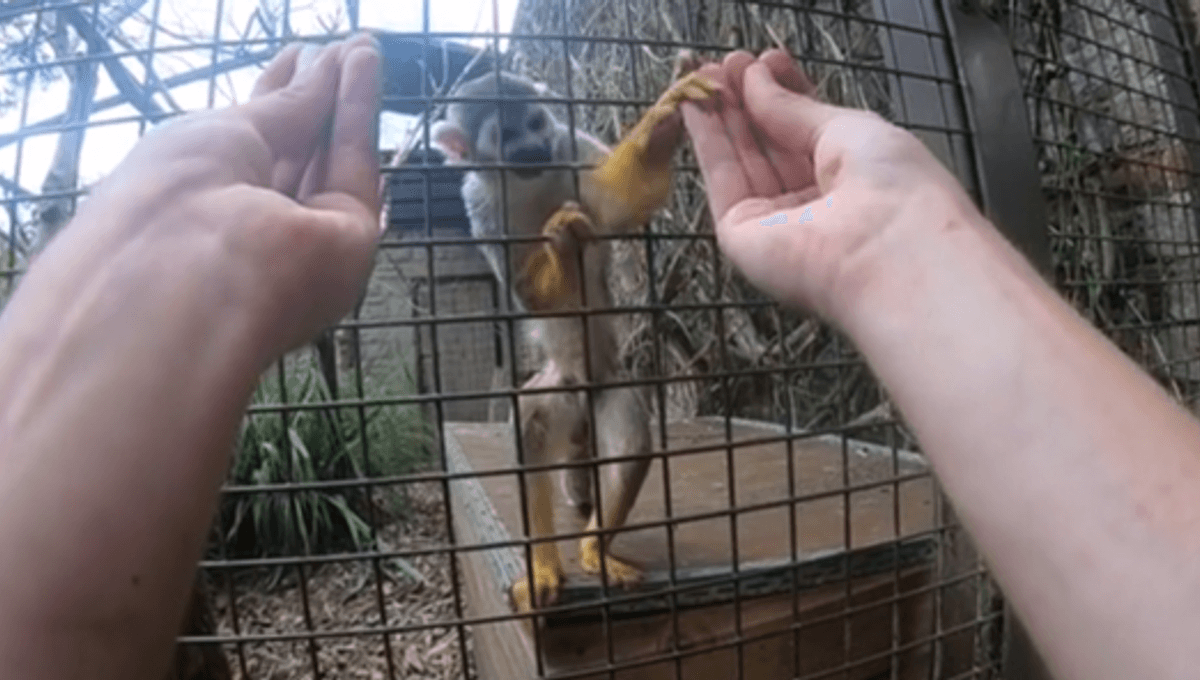
Scientists performed the famous magic trick known as the French drop for three species of monkeys and found one saw right through it. Crucially, the difference was not in the animals’ eyes, but in their hands. Those with opposable thumbs like our own were taken in by the performance, sharing our expectations of how the actions would play out, while those that lack thumbs didn’t see the point.
Entertaining primates at zoos by performing magic tricks has become a Youtube phenomenon. Scientists have realized this wholesome hobby could also help our understanding of the workings of animals’ brains. The idea has also yielded insight into the thought processes of trickster birds like the Eurasian jay.
Now the same team has moved on to closer relatives of ours. Led by magician and animal cognition researcher Dr Elias Garcia-Pelegrin of the University of Cambridge, a new paper has been published on the results of his magic tricks performed on New World monkeys.
Like a million budding magicians hoping to wow their parents, Garcia-Pelegrin showed the monkeys the classic French Drop: coin on one palm, he grabs it with a second hand while hiding his thumb. The big reveal shows that the coin is not in the second hand, where humans would expect it, but is in fact hidden in the first.
A skilled operator can make human eyes follow the second hand in the expectation the coin will be there. However, a key part of the deception is hiding the thumb of the second hand in such a way that the audience thinks it is holding the coin. Garcia-Pelegrin wondered if this would work on less thumb-dependent animals.
To ensure the monkeys focused, Garcia-Pelegrin replaced the coins with their favorite foods and had the subjects choose which hand they thought was holding the food. Correct choices were rewarded.
Capuchin monkeys, which crack nuts using tools held between thumb and fingers, picked the wrong hand for the peanut 81 percent of the time, indicating expectations similar to ours.
Marmosets’ thumbs are really just another finger, a major hindrance to world domination, leading them to win their prized marshmallow 94 percent of the time. Perhaps they wondered why these stupid humans were setting them such an easy test.
Squirrel monkeys represent an intermediary case. They don’t have as much control of their thumbs as capuchins or humans and can’t perform precision grips, but were more easily fooled, winning their mealworm in only 7 percent of trials. Maybe possessing a less sophisticated digit makes one particularly likely to be fooled by its tricks.
The results roughly reversed when the magician double-bluffed, actually taking the coin into the second hand.
“By investigating how species of primates experience magic, we can understand more about the evolutionary roots of cognitive shortcomings that leave us exposed to the cunning of magicians,” Garcia-Pelegrin said in a statement.
The findings are relevant not only for understanding the monkey brain, but our own. “There is increasing evidence that the same parts of the nervous system used when we perform an action are also activated when we watch that action performed by others,” said senior author Professor Nicola Clayton. “It’s about the embodiment of knowledge. How one’s fingers and thumbs move helps shape the way we think.”
The study certainly seems to confirm that. The team provided further evidence by creating a pan-primate magic trick they call the “Power Drop” capable of being performed by the hands of any of the monkeys in the study. This time all three species were fooled most of the time.
“Our work raises the intriguing possibility that an individual’s inherent physical capability heavily influences their perception, their memory of what they think they saw, and their ability to predict manual movements of those around them,” Clayton said.
The study is published in Current Biology.
Source Link: Only Monkeys With Opposable Thumbs Are Fooled By This Famous Magic Trick